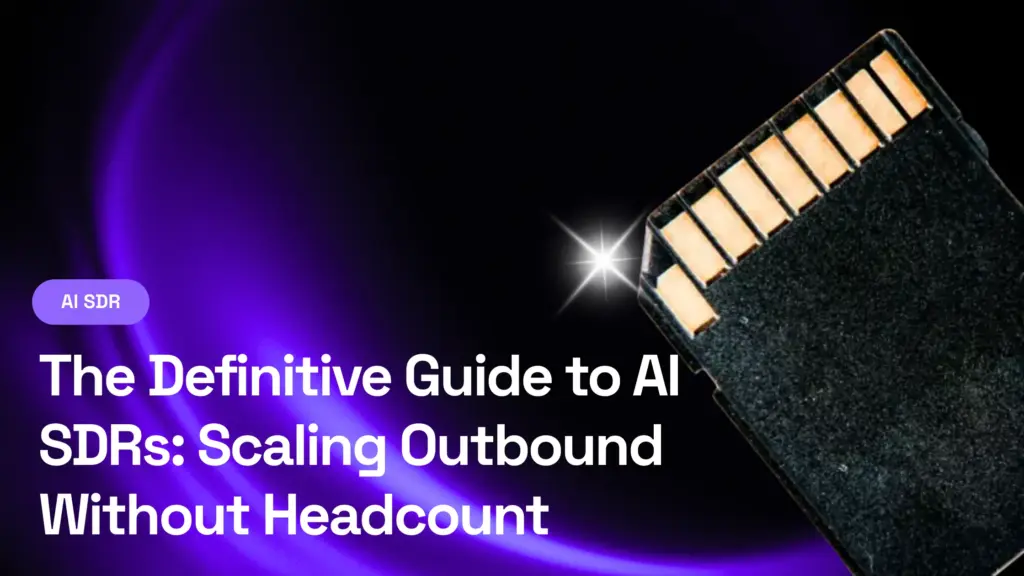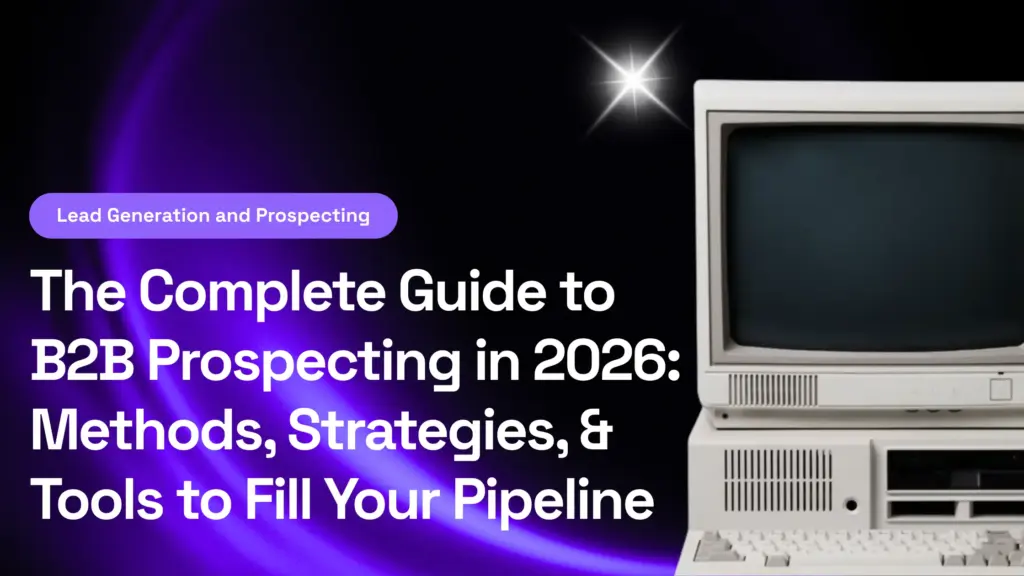Perhaps one of the most favored strategies that are growing popular every single day is Account-Based Marketing (ABM).
What is Account-Based Marketing (ABM)? ABM is a strategic approach where marketing and sales teams collaborate to focus their efforts on engaging and nurturing high-value accounts rather than broad audiences. Unlike traditional marketing, which casts a wide net, ABM zeroes in on specific companies, delivering highly tailored content and communications designed to meet their unique needs.
Many global firms have transitioned to ABM, largely due to its higher capability to deliver higher business ROI, greater customer involvement, and shorter selling cycles. Here in this article, advanced tactics of ABM, the essential metrics enabling AI solutions for a new ABM model, and much more will be discussed.
What is Account-Based Marketing?
ABM (Account Based Marketing) is a business-to-business marketing strategy focusing resources on select accounts with greater propensity to purchase. ABM differs from the generalized sweep approach taken to lead generation by being applicable only to individual businesses, creating personalized marketing campaigns and content that appeal directly to those targeted.
Core Principles of ABM:
1. Personalized Outreach
Unlike traditional marketing, ABM uses personalized content and messaging to reach target accounts. Every campaign is customized to address the unique pain points, objectives, and industry challenges of whom they are targeting. This degree of personalization helps establish deeper roots and drives more effective engagement than generic campaigns.
2. Tailored Communication
Instead of just churning out content, account-based marketing teams use messaging and data to target decision-makers and stakeholders within those high-potential accounts. This enables marketing and sales teams to concentrate where their efforts are most likely to be rewarded instead of going all-in on a large audience, hoping for the best.
3. Sales and Marketing Alignment
ABM excels in the close cooperation of the sales and marketing teams. This joint work across teams formulates strategies, identifies accounts, and builds relationships — from lead to deal. This alignment can create better processes and higher close rates.
ABM is especially helpful for B2B companies to increase ROI by focusing on a small handful of high-value clients. These are the accounts that often produce the largest revenue and longest-lasting partnerships. This allows businesses to more efficiently direct resources towards specific companies or industries and is more likely to lead directly to sales than broader marketing efforts.
Why Your Business Needs ABM (Supported by Statistics)
With businesses seeking more personalized and targeted marketing approaches, the rise of ABM is supported by compelling account-based marketing statistics that demonstrate its success across industries.
Key Account-Based Marketing Statistics Supporting ABM Effectiveness:
1. Higher Engagement Rates
Research from ITSMA suggests that engagement with target accounts increases by 50% through ABM. Account-based marketing statistics _ The personalized touch of ABM campaigns allows decision-makers and stakeholders within target organizations to connect easily, which is why such a high level of engagement is achieved by these stats.
2. Larger Deal Sizes
ABM drives larger deals. According to Forrester, companies using ABM see a 208% increase in the revenue generated by their marketing efforts. And these account-based marketing statistics confirm what you probably knew — those high-value accounts that can buy more are worth giving a little extra attention to.
3. Improved ROI
There are many reasons why ABM is crucial, one of them being the positive effect it has on ROI. Altera Group tells us that 97% of marketers have a higher ROI using account based marketing compared to other marketing newly introduced strategies.
4. Shortened Sales Cycles
ABM cuts down the time spent closing deals by 27% according to a Demandbase report. While these statistics highlight ABM as a fast way of closing deals and enabling sales and marketing teams to prioritize resources toward key accounts.
5. Increased Customer Retention
ABM is also a mighty customer retention weapon. SiriusDecisions reveals that it can also boost customer lifetime value by 36%, which is extremely important when trying to create relationships that will sustain themselves over time.
These account-based marketing statistics reveal ABM is no fleeting fad; it’s a strategy with a track record for measurable success. Increased engagement, bigger deals, and better ROI – it is what every B2B marketer wants, and the stats show that ABM provides a clear way to get there.
Account-Based Marketing Services: Traditional vs. Automated Approaches
Account-Based Marketing (ABM) has long been a favored strategy for B2B companies looking to engage high-value clients. Traditionally, ABM has been a manual, time-consuming process that requires extensive resources. However, advancements in automation are transforming ABM, making it more efficient and scalable, even for smaller teams. Let’s explore the key differences between traditional and automated ABM approaches.
|
Aspect
|
Traditional ABM Services
|
Automated ABM Solutions
|
|---|---|---|
|
Effort Required
|
Significant manual effort is required for identifying target accounts, conducting detailed research, and creating highly personalized campaigns.
|
Automation reduces manual labor, as AI-driven tools handle account identification, messaging, and insights, streamlining the entire process.
|
|
Time-Consumption
|
Extremely time-consuming due to the detailed research and content creation needed for each target account.
|
Automation tools cut down research time, using data-driven insights to target accounts more efficiently, allowing marketing teams to focus on higher-level strategy.
|
|
Personalization
|
Highly personalized, but every message and campaign must be crafted manually for each target account.
|
Personalized messaging is generated at scale using AI-powered solutions, ensuring a tailored experience without the need for manual creation.
|
|
Scalability
|
Difficult to scale due to the manual nature of the process, limiting the number of accounts that can be targeted effectively.
|
Highly scalable; businesses can engage with multiple high-potential accounts simultaneously, without the need for additional resources.
|
|
Resource Requirements
|
Requires significant resources (large teams or external consultants) to manage campaigns and nurture relationships effectively.
|
More resource-efficient, as automation handles much of the heavy lifting, making it accessible even for smaller teams with limited resources.
|
|
Decision-Making Focus
|
Marketing and sales teams spend a lot of time on operational tasks like content creation and research.
|
Teams can focus on strategy and high-level decisions, leaving routine tasks to automation tools.
|
|
Insights and Optimization
|
Traditional ABM requires manual tracking and analysis, which can be less dynamic.
|
Data-driven insights and AI-powered optimization continuously improve campaign effectiveness and ensure that the right content reaches the right decision-makers.
|
|
Overall Efficiency
|
Effective for a small number of high-value accounts but challenging to maintain as the number of accounts increases.
|
Increases efficiency by automating repetitive tasks, making ABM more manageable for a larger volume of accounts.
|
Automating The Challenge Of ABM with AnyBiz
Using AI-powered targeting, AnyBiz can help you quickly pinpoint high-potential accounts without a team spending hours on research. The combination of personalized messaging at scale means each account gets the type of content that is right for them while not requiring your team to spend all day creating the perfect piece for every individual target. It also automates standard workflows and makes routine tasks automatic, freeing up time for marketing to take on more strategic priorities.
AnyBiz is an excellent option for everyone out there, primarily small teams, because it makes ABM feasible and particularly attractive. Most of the time-heavy ABM process can be automated, allowing small teams with limited availability to create effective, highly tailored campaigns without additional efforts and personnel. This way, ABM is more cost-effective plus efficient.
So, while traditional ABM is a bespoke solution tailor-made for the client, this takes time and resources to research and do all these personalizations. Automated ABM solutions such as AnyBiz address this by making the process easier, bringing about personalized campaigns at scale, and making use of AI for stronger targeting and efficiency. Automation provides a way for businesses to implement the level of sophistication needed for ABM without the shortcomings inherent in traditional methodologies, and allows more businesses than ever before to effectively practice ABM.
The Role of Account-Based Marketing Agencies
Account-Based Marketing agencies focus on assisting companies in tailored marketing strategies to attract and convert high-value accounts. Rather than traditional marketing approaches targeting broad lead generation efforts, ABM agencies work directly with clients to create specialized campaigns targeting a small, strategic segment of key accounts for personalized and targeted outreach.
What Do Account-Based Marketing Agencies Do?
✅ ABM agencies provide data-driven insights to help businesses identify and prioritize high-equity accounts. This means reviewing the existing customer and opportunity base, and selecting industries with higher growth potential as accounts.
✅ ABM agencies develop unique marketing strategies with personalized messaging, creative content, and campaigns catered to address the specific pain points and needs of individual target accounts. These campaigns are usually multi-channel efforts, including email, LinkedIn, and direct mail.
✅ One of the most important functions an ABM agency plays is aligning both sales and marketing teams for improved efficiency. This involves interfacing with these departments to develop unified messaging and working collaboratively to align marketing initiatives with sales goals, significantly increasing efficiency.
✅ ABM agencies engage their focus accounts across multiple consistent touchpoints, including email outreach, social media engagement, marketing content activity, and paid advertising.
✅ ABM agencies provide detailed reporting and analytics on campaign performance, tracking key metrics like engagement rates, deal progression, ROI, etc. This allows businesses to more accurately fine-tune their ABM strategies on the fly.
How Do ABM Agencies Work?
The first pillar is that buy-side ABM agencies work closely with their clients to understand business goals, industry affinities, and target account profiles. They utilize a mix of creative services, data analytics, and marketing automation to execute precision campaigns. These agencies usually provide everything from full-service ABM solutions (managing the entire strategy and execution process) to specialized help, such as content creation or account research. The aim is to increase client engagement with target accounts and boost deal conversions by delivering a personal experience that speaks to key decision-makers.
Top Account-Based Marketing Agencies
Here are some of the most well-known account-based marketing agencies that excel in helping businesses implement effective ABM strategies:
Demandbase
- One of the leaders in the ABM space, Demandbase offers comprehensive solutions that combine data-driven insights with creative campaigns. Their platform integrates AI technology to help businesses identify target accounts, personalize outreach, and track ABM performance.
Terminus
- Terminus specializes in multi-channel engagement, combining email, social media, and digital advertising to create a cohesive ABM strategy. They offer a full-service platform for B2B companies to manage their campaigns and drive engagement with high-value accounts.
Madison Logic
- Known for its data-driven approach, Madison Logic helps businesses accelerate their sales pipeline by targeting key accounts with personalized content. They provide multi-channel solutions, including programmatic advertising and content syndication.
MRP
- MRP offers an AI-powered platform called MRP Prelytix, which helps companies run account-based campaigns across various channels. Their solution is focused on predictive analytics, enabling businesses to anticipate buying intent and engage accounts at the right time.
Triblio
- Triblio is a leader in personalized ABM campaigns, offering services that integrate marketing automation, intent data, and analytics. Their platform is designed to engage target accounts through personalized messaging across web, email, and advertising channels.
Jabmo
- Jabmo focuses on ABM for global enterprises, offering an account-based advertising and marketing automation platform. Their solution helps businesses personalize communication and monitor engagement across target accounts, enabling them to scale their ABM efforts.
AnyBiz: A Cost-Effective Alternative to Account-Based Marketing Agencies

For businesses looking to implement ABM strategies without the high costs associated with agencies, AnyBiz offers a powerful alternative. By combining AI-driven technology with easy-to-use tools, AnyBiz enables businesses to run their own ABM campaigns in-house, offering many of the same capabilities that an account-based marketing agency would provide.
AI-Powered Targeting and Engagement
AnyBiz uses advanced AI-driven algorithms to help businesses find and engage the most relevant accounts for their products or services. The platform continuously scans for signals that indicate a company’s potential interest, allowing businesses to focus their efforts on the most promising accounts. This automation eliminates the need for manual prospecting, allowing teams to focus on more strategic activities.
Related – 5 Best Strategies for Finding Your Target Audience Using AI
Automated Personalization Across Multiple Channels
One of the key strengths of AnyBiz is its ability to deliver personalized outreach across multiple channels, such as email, LinkedIn and AI cold call. The platform’s AI-powered sales agents craft highly personalized messages based on insights gathered about the target accounts. This ensures that each message resonates with the specific pain points, needs, and goals of the recipient, increasing engagement and the likelihood of conversion.
Whether it’s crafting tailored emails or initiating conversations on LinkedIn, AnyBiz’s automation makes it easier to engage with decision-makers at target accounts through the channels they prefer, without the need for constant manual intervention.
AI Sales Agents: Continuous Engagement
AnyBiz takes ABM a step further with its AI sales agents, which work continuously to find and engage potential customers. These AI agents act like virtual sales development representatives (SDRs), identifying key decision-makers, sending personalized outreach, and even following up based on account behavior and responses. This enables businesses to maintain consistent engagement with their target accounts, ensuring no opportunities are missed.
Real-Time Reporting and Metrics
In ABM, tracking campaign success is critical. AnyBiz offers real-time reporting and analytics, allowing businesses to monitor the effectiveness of their campaigns at every stage. With this data readily available, businesses can quickly identify what’s working and where adjustments are needed, enabling them to optimize their ABM strategies for maximum impact.
Cost-Effective and Scalable Solution
Compared to traditional account-based marketing companies, which often require significant resources and high costs, AnyBiz offers a cost-effective and scalable solution. ABM agencies typically involve large teams and substantial fees to manage ABM campaigns, but with AnyBiz, businesses can achieve similar results without the overhead. The platform’s AI-powered automation reduces the need for large marketing and sales teams, making ABM accessible to companies of all sizes.
Whether a business is just starting its ABM journey or looking to scale its existing efforts, AnyBiz provides the tools necessary to run successful campaigns without breaking the bank. Its AI-driven approach to ABM helps companies focus on high-value accounts while delivering personalized outreach, continuous engagement, and real-time insights – all in a highly scalable and cost-efficient manner.
With its combination of AI-powered targeting, multi-channel personalization, and real-time reporting, AnyBiz positions itself as the best tool for businesses looking to execute effective ABM strategies, providing a robust alternative to traditional account-based marketing companies.
Ready to supercharge your Account-Based Marketing? Try AnyBiz today with a 7-day free trial and experience the power of AI-driven outreach, personalized engagement, and real-time reporting. Don’t miss out – start your ABM journey now and unlock high-value accounts effortlessly!
Conclusion
Account-Based Marketing (ABM) has quickly established itself as a key tactic for B2B brands that want to make stronger inroads into their highest-value accounts. ABM lets companies align their marketing and sales efforts more efficiently and effectively by focusing on personalized outreach and targeted communication. Tracking key metrics like engagement rate, win rate, and ROI helps marketers understand the success of ABM campaigns and adjust strategies when necessary.
With the growing role of AI and increased adoption of ABM, companies can now execute Account-Based Marketing at scale. Using the right tools and best practices allows businesses to enhance their ROI, build lasting customer connections, and drive growth. Whether partnering with ABM agencies or deploying AI-powered platforms, adopting an ABM approach is a smart move for B2B brands looking to stay competitive.
📜 Related articles:
FAQ
1. What is the difference between inbound marketing and ABM?
Inbound marketing focuses on attracting a broad audience through content creation, SEO, and social media to generate leads. In contrast, an ABM program is more targeted, concentrating on specific high-value accounts and developing personalized outreach to engage them. Both strategies can complement each other in a successful marketing approach.
2. How can I integrate inbound marketing with an ABM program?
Integrating inbound marketing with an ABM program involves using content to attract the right audience while personalizing outreach for target accounts. Inbound strategies can generate interest from broader audiences, while ABM ensures that high-priority accounts receive tailored, relevant engagement for deeper connections.
3. What are some key ABM tactics to drive account engagement?
Successful ABM tactics include personalized messaging, multi-channel outreach (email, social media, direct mail), and creating content specifically for high-value accounts. These marketing tactics help increase account engagement by addressing the specific needs and pain points of the target accounts.
4. What marketing tools are essential for running an ABM program?
Key marketing tools for a successful ABM program include CRM systems, marketing automation platforms, and data analytics tools. These tools enable businesses to track account engagement, personalize communications, and measure the success of various ABM tactics.
5. How do you measure a successful ABM campaign?
A successful ABM campaign is measured by metrics like account engagement, win rates, and ROI. High account engagement, where target accounts interact with personalized content, along with increased conversions, indicates that your ABM tactics and marketing tools are effectively driving results.
6. What role does personalization play in an ABM program?
Personalization is at the heart of a successful ABM approach. Unlike broader marketing tactics, ABM tactics focus on delivering tailored messages, solutions, and content that specifically address the needs and challenges of target accounts, ensuring deeper account engagement and better conversion rates.




